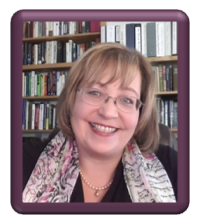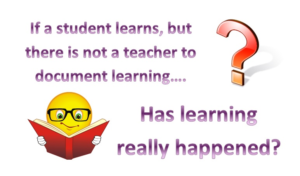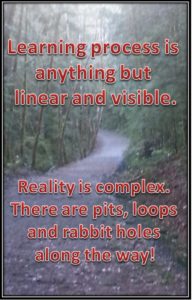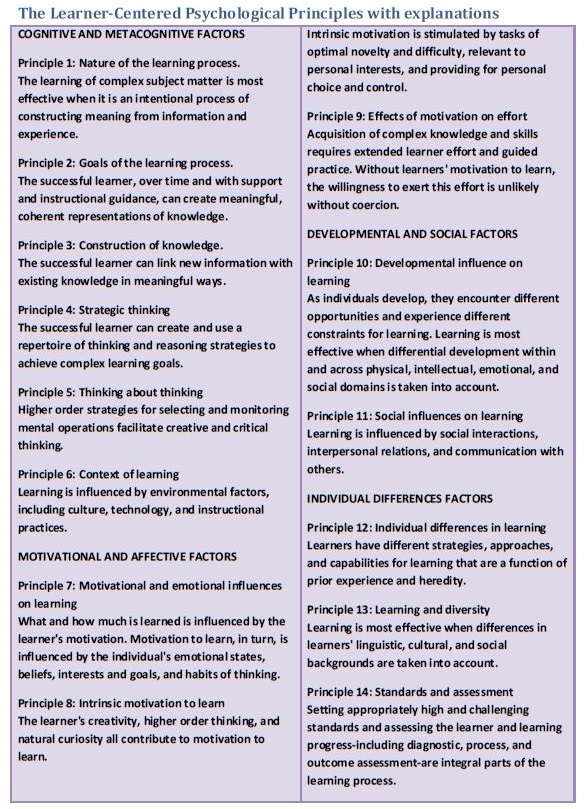
Welcome to Nina's Notes
 |
Hi! Thanks for dropping by!
This website is a repository of ideas and perceptions of best practices in education collected during my teaching and learning experiences on two continents. I hope these insights are helpful for faculty, teachers and professional development providers!
Learning is such a fascinating concept: we interact with our environment and other people, gathering information through our experiences, and then individually elaborate to create understanding from the experiences. And everyone's experiences and and therefore also learning results are different! (as they should, learning being such a subjective phenomenon)
Within all levels of education, learning happens in the same way – by acquisition and elaboration – but instruction must certainly be adapted to meet the needs of your students. Younger students definitely need more help and support in learning to learn, but even adult students benefit from interactions with teachers/faculty.
Teaching is such a wonderful profession, because we get to share a part of our students' journey of life. We are trusted with great responsibility, because our words may have a lifelong impact. All teachers I know want to positively affect the lives of the students they teach.
Because we care.
However, being a teacher is not always easy. Students' academic performance depends on many other factors in addition to what the teacher does. Learning doesn't always require instruction. We learn pretty much on our own from our everyday experiences. Instruction doesn't always lead to learning. But in IDEAL situations these two processes balance each other.
I help faculty and teachers to improve learning in their classroom and provide 3C tools to make learning and teaching more effective and enjoyable. These tools are compatible with all curricula and instructional design models, and they reflect the best pedagogical practices outlined by American Psychological Association publication Top 20 Principles (please see the definition of learner-centered education below). Because Nina's Notes focuses on supporting the learning process, also discussions about Self-Regulated Learning (SRL) are an important part of the support for faculty and teachers. Here is a one-page overview of SRL for adult online learners.
Click here to email Nina for any questions.
I hope you enjoy!

3C-approach in Nina's Notes
Nina's Notes promotes student-centered 3C - teaching and learning based on contemporary learning theories and Finnish pedagogy. Who dares to teach must never cease to learn.~John Cotton Dana
COMPASS learning: Documenting learning:
Documenting learning:
 Learning process:
Learning process:
 How to grow learners:
How to grow learners:
 Learning is best when enjoyed. Cafe your days and enjoy!
Learning is best when enjoyed. Cafe your days and enjoy!Learner-centered
I often see various educational approaches and products being labeled and marketed as "learner-centered" or "student-centered". But what does that really mean? Simply stating something doesn't make it so. There must be solid researched educational principles and practices in place to make teaching and instruction learner-centered.
Providing learner-centered education means acknowledging the individual differences among learner group and providing instruction that focuses on supporting the learning process. Considering learners as agents of their own lives and learning yields for best research-based approach for supporting motivational and self-regulatory practices for students of all ages. Central tendencies in learner-centered education are to:
(a) include learners in decisions about how and what they learn and how that learning is assessed
(b) value each learner’s unique perspectives
(c) respect and accommodate individual differences in learners’ backgrounds, interests, abilities, and experiences, and
(d) treat learners as co-creators and partners in the teaching and learning process.
While it appears that most research is done in K-12 learning environments, it is important to remember that student-centeredness is not a practice belonging solely to formal and formative education, but an educational approach suitable for all education and training.
Defining Learner-Centered education
American Psychological Association (APA) defined learner-centered education in 1990 and revised it in 1997 (McCombs work) to show 14 principles of learner- centered psychological principles for education. I condenced the table to fit into one page and used it in my dissertation.

In 2015 these learner-centered principles were updated to the “Top 20 Principles from Psychology for pre-K to 12 Teaching and Learning”.
These Top 20 principles have been divided into 5 areas of psychological functioning:
- Cognition and learning: How do students think and learn?
- Motivation: What motivates students?
- Social context and emotional dimensions: Why are social context, interpersonal relations and emotional well-being important to student learning?
- Context and learning: How can the classroom best be managed?
- Assessment: How can teachers assess student progress?
I consider the APA to be the highest authority of educational psychology in the U.S. and a positive influence in the education world in general. Education is about looking both into the past and into the future, which is why it also has two opposite purposes: to ensure cultural progression and to prepare students for their unknown future.
Cultural progression is necessary for societies to have members who will know about the past (history) and the traditions (culture), but emphasizing the traditional ways of doing things may cause difficulties for students to learn for the future. Yet, not knowing the history could cause us to repeat the mistakes of the past generations. For anyone engaging in instruction this is just one of the many dichotomies of the teaching-learning situation. Finding balance is important because both past and future are necessary in understanding the process.
Modern educational theory and practice are built on the premise of education being the process for students to “develop their rational faculties so that they become capable of independent judgement”. This requires for students to engage in three-dimensional learning process and grow their skills, knowledge and understanding. The role of instructor is to support this growth.
Here is a link to the APA Top 20 Principles. I wish every teacher had a PDF copy of them!
Copyright 2001-2025 by Nina C. Smith all rights reserved